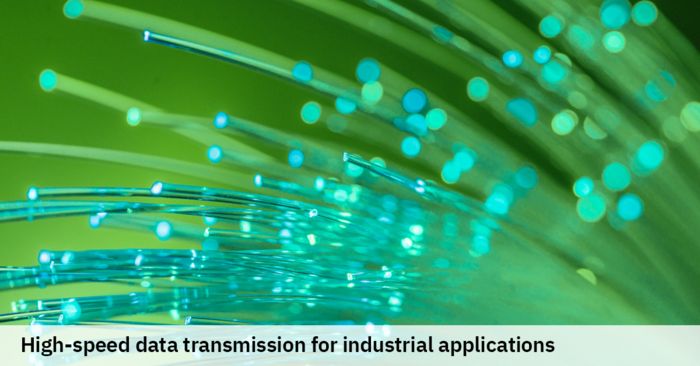White papers Industry insight, product discussion and in-depth analysis written by our leading product experts.

Data Centers

Fiber optics: High-speed data transmission for industrial applications
Fiber-optic cables transmit data in the form of light over long distances. This paper looks at the characteristics of fiber-optic cables, the types of applications suitable for different types of fiber and cable, and the connection technologies available.
Energy

Dell Technologies and Phoenix Contact: Partnering to support decarbonization through best-in-breed solutions
Using their respective strengths in engineering and product development, Dell Technologies and Phoenix Contact collaborate to help electric utility companies accelerate the adoption of the Virtual Protection, Automation and Control (vPAC) environment.

High-fault short-circuit current ratings (SCCR) for Phoenix Contact terminal blocks combined with Siemens circuit breakers
All switching devices in the U.S. require UL approval, including those in process engineering. This paper describes Phoenix Contact products that have been subjected to a special test that simplifies the development and qualification of switching devices for the US
market.
Connectivity

A guide to thermal management solutions for electronic enclosures
As devices become smaller and power density rises, effective thermal management during the design process is critical. To reduce heat, design engineers need to consider material selection, design style, construction methods, and other factors.

IP Communications on Edge Devices
While serial protocols have been the preferred method of communications for field devices for decades, increased productivity and the need for real-time communications require the higher bandwidths and the lower latencies achieved with IP communications. And while solutions for Ethernet all the way to the field continue to become popular, repurposing serial cabling for IP communications could be a viable option in some applications.

Saving space in control cabinet wiring through innovative connectivity solutions
Space is at a premium in control cabinets, and components are becoming smaller to meet this demand. Recent innovations are minimizing the footprint of power distribution in nearly any control cabinet.

An introduction to cellular networks
As industries become more automated, reliable and efficient networking solutions have become essential for seamless operations. This white paper provides an overview of key networking concepts related to cellular routers.

The need for robust and reliable connectors
Residential energy storage systems (RESS) are one of the growing ways to realize this vision of an All Electric Society. Designed for use in homes, an RESS stores excess energy generated by renewable sources, such as solar panels, for use on demand when a residence truly needs it.

Connector and cable considerations: Utility-scale energy storage battery racks
Electricity in our daily lives is an unconscious convenience until it is not available. Planned, unplanned, and controlled outages in the form of blackouts cause disruption. Climate change-inducing extreme weather events that contribute to outages are making energy storage more important than ever. This white paper will investigate the role that connectors and cables play in energy storage systems.

Single Pair Ethernet in Building Automation
In existing buildings, it is worth taking a closer look at the existing cabling infrastructure to minimize the ecological footprint of the building over its entire life cycle. But to what extent is it possible to reuse existing building automation cables for Single Pair Ethernet (SPE)?

High-Speed connector optimization through simulation and measurements
As the demand for networked devices in the field increases, so does the need for high-performance connectors and cables that can transmit data in a variety of environments. The goal is to transmit data efficiently while minimizing losses. While there are many different connector options in the market, high-speed applications often require specific optimization techniques, such as testing and simulation, to achieve maximum performance.

Advantages of standard digital output I/O cards over relay output cards
Relay output cards have hidden pitfalls, including current and voltage output, reliability and maintenance, and density. A system cabling approach offers an alternative to relay output cards that can enhance operator safety, reduce costs, increase reliability, and optimize cabinet space.

Building a heavy-duty connector set
Heavy-duty rectangular connectors are generally acquired in several pieces that can be mixed and matched to create an almost endless number of different connector configurations. This paper helps break that process down, so it feels a little more manageable.

Power wiring made easy
New high-current terminals allow for easy, fast, and safe connections with large cable cross-sections.
IIoT

Making OPC UA solutions easy to use: Efficient engineering with a hands-on approach
This paper explains the three pillars of OPC UA. While OPC UA is large in scope, this paper gives some simple steps to get started with the technology. It also explains how an automation system with a comprehensive OPC UA portfolio can help users implement OPC UA efficiently.

Smart edge computing with PLCnext Technology: Foundation for optimizing the entire value chain
Modern edge devices combine the robustness of proven industrial PCs with an open automation platform. Intelligent IoT edge concepts can be built with this approach.Using edge devices to process and analyze the growing volumes of data can optimize the entire value chain.

Saving time and cost while increasing safety and quality through the use of the digital twin
This paper explains how the interaction between RF::Suite Software and PLCnext Engineer can open a wide range of possible uses for the digital twin.

Cloud connectivity on the factory floor
This white paper covers everything you need to know to get started with cloud connectivity and IIoT on the factory floor. From going through the challenges and benefits of IIoT to understanding key technologies and best practices, you’ll gain a foundation that will help you understand your options, plot a strategy, and move forward.
Power

Surge protection devices and electrical filters: applications and design considerations
Typical surge protective devices have limited filter capabilities. A quality SPD/filter product can mitigate the damaging effects of surge activity and disrupt noise interference.

For the machine building industry: Simplicity,reliability, availability, and flexibility
A power supply with an integrated circuit breaker can meet the high demands of the machine building industry.
Factory Automation

Wire stripping in focus
This paper explains the importance of stripping wires properly and the differences between hand tools and automatic tools for stripping. It will help you choose the best stripping tool for your specific job.
Process Automation

The open PLCnext Technology ecosystem in thermal processing technology: Fewer emissions with a higher overall equipment effectiveness
As companies worldwide work toward net-zero emissions and improved sustainability, energy-intensive industries must find new ways to convert existing thermal processes to low-carbon or carbon-free ones.With PLCnext Technology, including the MLnext software, these companies can proactively address this challenge.

Internal overvoltage protection(OVP) in DIN rail power supplies: What you need to know to protect your critical devices
This white paper educates readers on why they should be concerned about the activation of their power supply’s OVP and the potential damage it may cause. It is extremely important for the reliability of a system that field devices and the power supply’s activated OVP level can exist in harmony.

Certification, redundancy, and functional safety: Safe power supplies in the process industry
Permanent system availability and high operational safety are of paramount importance in the process industries. Power supplies with new functionality ensure higher system availability and operational safety.

10 advantages of using intrinsic safety technology for hazardous locations
This paper lists ten reasons to consider using intrinsic safety when feasible.

Trusted Wireless 2.0: Wireless technologies in industrial automation
This white paper gives an overview of Trusted Wireless 2.0, a wireless technology developed especially for industrial use. This technology is based on the requirements of industrial infrastructure applications.
